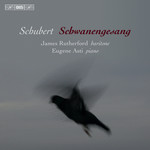
Schubert: Schwanengesang
 $35.00
Out of Stock
$35.00
Out of Stock6+ weeks add to cart
FRANZ SCHUBERT
Schubert: Schwanengesang
James Rutherford (baritone) Eugene Asti (piano)
[ BIS SACD / Hybrid SACD ]
Release Date: Friday 25 March 2016
This item is currently out of stock. It may take 6 or more weeks to obtain from when you place your order as this is a specialist product.
Compared to Franz Schubert's two 'true' song cycles, Die schöne Müllerin and Winterreise, Schwanengesang poses far more questions - to performers, listeners and musicologists alike. It is in fact a compilation of two different sets of songs, to texts by Ludwig Rellstab (seven songs) and Heinrich Heine (six). In his manuscript, dated 'August 1828', Schubert wrote out the songs without any title page or numbering. Following the composer's death three months later, the publisher Tobias Haslinger added the single song Die Taubenpost, written in October 1828, and brought out the posthumous collection entitled, appropriately, 'Swan Song'. How, or indeed if, Schubert himself intended to combine these songs, we do not know - and rather than a cycle developing a single narrative thread or state of mind, they form a series of masterful snapshots of all that life can offer. (The four miscellaneous songs which close this programme serve as a further demonstration of the astonishing versatility of their maker and his boundless musical resourcefulness.) As a result performances of Schwanengesang usually vary, with certain songs left out, unrelated songs being included, and the order of the songs adapted according to the occasion. During the 15 years that they have collaborated on these songs, James Rutherford and Eugene Asti, have done all of the above, but for their recording of the collection they have decided to stay as close to the original as possible, with the exception of including Herbst, another Rellstab setting from Schubert's final year. Schubert's manuscript is written for high voice, and Rutherford and Asti has chosen to transpose each song down a minor third - a seemingly obvious decision, but in fact this recording is one of the few, if not the only, by a baritone in which the original tonal relationships between the songs is retained.
"His baritone has almost everything for the Schubert selection on this disc: lightness at the top, warmth in the middle, velvety low notes, and an edge that ensures the words cut through. In dramatic songs he's capable of quicksilver changes of timbre." The Guardian
"[James Rutherford] has at his disposal a wonderfully healthy and rounded bass-baritone voice…and his German is impeccable…the cycle has a slow-burn cumulative power, and if Rutherford's tone - occasionally a touch nasal but essentially benign in its ruddy, plump-cheeked healthiness - can't communicate the tortured grandeur of the young Bryn Terfel, his interpretation grows in emotional urgency as it progresses" Gramophone
Tracks:
Schwanengesang, D. 957 (including Herbst, D. 945)
Die Forelle, D. 550
Auf der Bruck, D. 853
Gruppe aus dem Tartarus, D. 583; An die Musik, D. 547